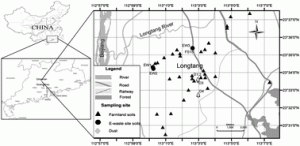The dumping of e-waste is an ever-increasing environmental problem. Individuals and organisations are changing their mobile phones and computers at faster and faster rates to keep up to date with the latest technological innovations. 80% of the world’s e-waste is exported to Asia, with the vast majority ending up in China where the environmental regulations are softer and the cost of labour is lower.
 The recycling of e-waste in China often involves environmentally unfriendly processes. Now mostly banned from use, PCBs are still prevalent in the majority of older electronic equipment, which is now e-waste. PBDEs are also used as flame retardants in electronics. These chemicals and heavy metals are released into the environment during e-waste recycling
The recycling of e-waste in China often involves environmentally unfriendly processes. Now mostly banned from use, PCBs are still prevalent in the majority of older electronic equipment, which is now e-waste. PBDEs are also used as flame retardants in electronics. These chemicals and heavy metals are released into the environment during e-waste recycling
Researchers at the Guangzhou Institute of Geochemistry, Chinese Academy of Sciences, China, describe an extensive study into the soil contamination levels in an e-waste region of Southern China. They identify which recycling activities emit which pollutants and look at the links between contamination levels in recycling sites and in local agricultural soils.
They find that local paddy and vegetable field soils are contaminated with the same heavy metals found at the recycling sites and this contamination may have been distributed via ponds and streams. This work will inform the reform of e-waste recycling policies and the team plan to investigate the mobility and toxicity of the contaminants in detail.
This HOT article on the processes of an important modern environmental issue is now free to access for the next 4 weeks*!
Heavy metals and organic compounds contamination in soil from an e-waste region in South China
Ming Liu, Bo Huang, Xinhui Bi, Zhaofang Ren, Guoying Sheng and Jiamo Fu
DOI: 10.1039/C3EM00043E
*Free access to individuals is provided through an RSC Publishing personal account. Registration is quick, free and simple










